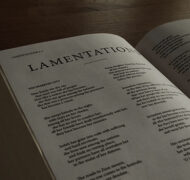Jeremiah the Poet at Work: Lamentations
Bible Commentary / Produced by TOW Project
If I’m Suffering, Is God Punishing Me? (Click Here to Read)In this daily reflection from The High Calling, Mark Roberts considers the place of suffering in our daily life and work. In many cases, we will not know the precise reason for our suffering. But the good news is that God can and will use it for good in our lives, if we let him. |
While we do not have internal proof that the Lamentations were written by Jeremiah, rabbinic tradition, the parallel themes in Jeremiah and Lamentations, and the eye-witness character of the laments point to Jeremiah as the likely author of these five poems of lament.[1] Judah and its capital, Jerusalem, have been totally destroyed. After a two-year siege, the Babylonians have captured the city, torn down its walls, looted and destroyed God’s temple, and taken the able-bodied citizens into exile in Babylon. Jeremiah is among the few survivors left in the land, living among those who had clung to life through the famine and watched starving children die, as false prophets continued to mislead the people about God’s purposes. The book of Lamentations captures the desolation of the city and the despair of the people at the same time that it underscores the reason for this desolation.
Here we see the poet at work. In five tightly structured poems, he uses powerful images of the carnage in the city as God allows the punishment of his people for their vicious sins. But in spite of the emotional depth of his grief, the artist captures the devastation in a controlled poetic form. This is art in the service of emotional release. While a discussion of “work” doesn’t often include the work of artists, these poems force us to acknowledge the power of art to encapsulate the highs and lows of human experience.
The artist embeds a note of hope in this despair, anchoring the future in the goodness of God:
But this I call to mind, and therefore I have hope: the steadfast love of the Lord never ceases, his mercies never come to an end; they are new every morning; great is your faithfulness. ‘The Lord is my portion,’ says my soul, ‘therefore I will hope in him.’ The Lord is good to those who wait for him, to the soul that seeks him. (Lamentations 3:21-25)
For the Lord will not reject forever. Although he causes grief, he will have compassion according to the abundance of his steadfast love; for he does not willingly afflict or grieve anyone (Lam. 3:31-33).
Why should any who draw breath complain about the punishment of their sins? Let us test and examine our ways, and return to the Lord. Let us lift up our hearts as well as our hands to God in heaven (Lam. 3:39-41).
Art in the Time of HolocaustThe art found in Yad Vashem reveals that art has the power to explore pain, healing, and tender hope. It tells the stories of individuals who hurt, loved, died, fought, and hoped, and it invites us to enter into their stories and lives. It reminds us so that we, too, may fight evil and search out beauty and goodness in our lives and in our art. Read more. |
In the destruction of Jerusalem, the innocent suffered alongside the guilty. Children starved and faithful prophets like Jeremiah bore the same misery meted out to those whose sins brought an end to the city. This is the reality of life in a fallen world. When corporations collapse under the weight of bad decisions, gross negligence or outright illegal practices, innocent people lose their jobs and pensions along with those who caused the debacle. At the same time, for the Christian in the workplace, the inequities in this life are not eternal. God reigns and his compassion never fails (Psalm 136). It’s not easy to hang onto that divine reality in the midst of sinful systems and unprincipled leaders. But Lamentations tells us, “The Lord will not reject forever.” We walk by faith in the living God whose faithfulness to us will not fail.





